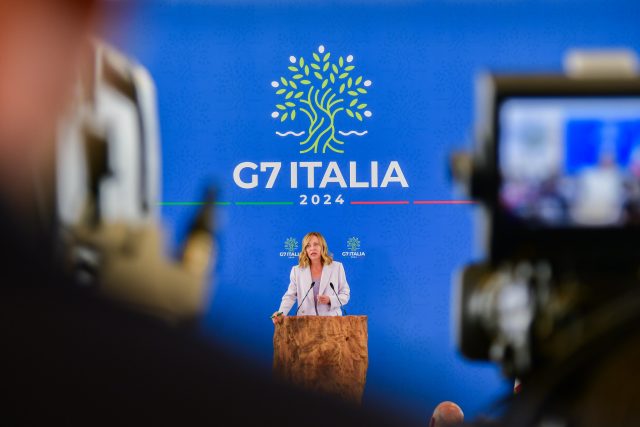
Success in Puglia. The summit presided over by the President of the Italian Council of Ministers, Giorgia Meloni, has concluded with agreements of great significance for the most important geopolitical issues, as well as the role to be played by Western countries in the face of these international threats. These conclusions have evidenced the leading role played by Meloni as hostess before some of her counterparts, such as the President of the French Republic, Emmanuel Macron, or the President of the United States, Joe Biden. In addition to the leaders of the seven most important democracies in the world, top-level guests such as the President of the Republic of Argentina, Javier Milei, and the head of the Catholic Church, Pope Francis, attended the event.
On the one hand, the G7 leaders have concluded with a strong warning to Iran for its constant support to Russia in its invasion of Ukraine, who could expect from now on a quick and coordinated response in case it does not stop supplying weapons to Russia. In addition, the Nicolas Maduro regime in Venezuela has also received reprimands regarding its continued harassment of political dissidents, being urged to hold fair elections.
However, the most significant G7 rebuke seems to have been against the People’s Republic of China, both for having helped the Russians to acquire war material through its financial institutions and for engaging in trade practices that are unfair to Western markets.
Moreover, this G7 summit was the first in history to be attended by the Supreme Pontiff. Francis I has conveyed to world leaders his concern about the advance of Artificial Intelligence. In this sense, the Pope declared that “No machine should ever choose to put an end to the life of a human being”, in reference to the application of AI to war machinery. Francis was able to meet with leaders present at the summit, such as Giorgia Meloni herself, the President of Ukraine Volodomir Zelenski, or President Macron.
As if that were not enough, Meloni would have won an arm wrestle with Macron on the issue of abortion. Following the recent incorporation of a “right to abortion” in the French constitution, Macron has sought to impose the same spirit on the summit by involving the other world leaders in a joint declaration in favor of abortion rights. This proposal would have prospered had it not been for the insistent opposition of Meloni, who went so far as to withdraw this issue from one of the final drafts of the summit. Macron declared, “France has a vision of equality between women and men, but it is not shared across the political spectrum. You do not have the same sensitivity in your country. I regret it.” Following this, Giorgia Meloni would reproach Macron that it is deeply inappropriate to “campaign for election using a forum like the G7.”
In short, the world’s most consolidated democracies have reaffirmed their support for Ukraine, have shown determination in the face of great powers such as China and have counted on the presence for the first time of the head of the Church. They have invited great allies of the West such as the Indian Prime Minister or the President of Argentina, enemies of the advance of socialism in Asia and America and, above all, they have reaffirmed a sensible and determined commitment to Western values. Undoubtedly, Giorgia Meloni has played a fundamental role in the development and conclusion of the meeting, exercising a leadership that consolidates with the passage of time, and that stands out among the moment of great unpopularity of the rest of her counterparts.



 Subscribe
Subscribe